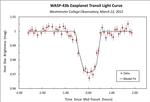News & Events
Exoplanets Detected from Westminster College Observatory
Posted on Tuesday, April 3, 2012
The Westminster College Observatory has detected five exoplanets (planets orbiting stars other than our sun). These are not new discoveries, but the detections are significant because they demonstrate Westminster's capability to join the search for new exoplanets.
The observations occurred during the last two weeks of March and were conducted by Dr. Thomas Oberst, Westminster assistant professor of physics, and senior physics majors Will Armentrout and Daniel Giles.
"We are very excited that we were able to observe these alien worlds," Oberst said.
Oberst explained that most exoplanets are too far and too dim to be seen directly with current technology. If a planet's orbit happens to be aligned with Earth, however, the planet will periodically cross in front of (transit) its host star as seen from Earth, causing the star to temporarily dim. Exoplanets can thus be detected by looking for periodic dips in stars' brightness.
One transit observed from Westminster was caused by exoplanet WASP-43b, a planet slightly larger than Jupiter orbiting a star slightly smaller than the sun over 250 light years away. The next step for Oberst and the students is to minimize the noise (scatter) seen in the data (see sidebar).
"If we can cut the noise in half - and we have some good ideas how to do that - we should be able to search for new Jovian-sized planets around sun-like stars or red dwarfs," Oberst said. "Many of the dimmer stars in the sky have not yet been searched."
Smaller, Earth-sized planets cannot currently be observed from the ground but they are being found by NASA's Kepler space telescope.
"The Jupiter-sized planets we can detect are unlikely to harbor life," Oberst said. "But where there is one planet there are usually others, so finding big planets prompts later searches for smaller planets around the same stars."
The project was supported by the Eden Hall Foundation and Westminster's Department of Physics, Drinko Center for Experiential Learning, and Faculty Development Committee.
Armentrout and Giles presented the initial results at the National Conference on Undergraduate Research March 29-30 in Ogden, Utah.
Armentrout is a son of W. Jan and Mary Jane Armentrout of Ford City and a graduate of Ford City High School.
Giles is a son of Rhinee Yeung of Issaquah, Wash., and a graduate of Issaquah High School.
Oberst, who has been with Westminster since 2008, earned an undergraduate degree from Duquesne University and master's degree and Ph.D. from Cornell University.
Contact Oberst at (724) 946-7204 or email for additional information.


More Stories



